Finding a suitable home router is like just another day of shopping online. You go to Amazon and sort by the best ratings. The product with good reviews and fits in the budget lands in your cart. Even your Internet provider can hook you up with a good one by paying a small amount.
On the contrary, as a business, you cannot do the same. The router provided by the ISP is not efficient and cut for handling commercial usage. With privacy and security gaining prominence among businesses, it is crucial to look for routers with provision for VPNs. Most routers allow VPNs, but they fall short with the limited tunneling and connection behavior which restricts the overall connection.
You need a router that accommodates VPN usage while not bogging down the performance of your normal usage on a typical day of work. Look for these pointers while selecting a router.
1. How to Select a Router
1.1 Dual or Tri-Band?
Single bands will sit this one out. See if your router has dual bands or not, which you generally can find by the number of antennae it has. Having two antennas means one is dedicated to 2.4 GHz while the other takes on the 5 GHz band. Having a Tri-band is even better if it fits your budget. This way, two antennas can be dedicated to the 5 GHz band, providing a better Internet change.
1.2 Firmware
Firmware acts as the “operating system” of your router. It defines what functionalities and abilities the router can offer, apart from the hardware limitations. Routers with in-built VPN capabilities are comparatively heavier on the pocket but value for money. When you are on a tight budget, you can settle for a regular router that can have a third-party firmware update, which will bring advanced VPN features to it. Now bear in mind that doing this may void your warranty or brick the device in a worst-case scenario.
1.3 What Connection Speed Do You Want?
This is equally important. Choosing a good VPN router also involves ascertaining the speed you want over the ethernet and Wi-Fi. Some routers offer comparatively slower speeds and can really hamper your entire work. Pair a slow router with a VPN, and you have yourself an Internet explorer level Internet snooze-fest.
Ethernet will mostly be fine as most routers are equipped with a Gigabit connection, but Wi-Fi can be a drag unless the older standards. Aim for 802.11ac, and all your bases will be covered.
1.4 Number of LAN required
The more is always better when it comes to these. LAN(Local Area Network) is of two types, wired and wireless, known as WLAN. The LAN ports allow you to connect with different devices, such as a smartphone with the router, which provides Internet. Here the thumb rule for protons would be four or more would be good. You can also expand the number of ports by attaching a network switch.
1.5 Wi-Fi Protection
Some of your devices will rely on the Wi-Fi network to access the Internet. Using a VPN will be a step in the direction of security, but that is not enough these days. Your Wi-Fi network is vulnerable to DDoS attacks, hacking, and other nefarious activities. Choose a router with WPA(Wi-Fi Protected Access) encryption which is a robust layer of security for the network. Consider going for routers with WPA, WPA2, or even the WPA3(if available).
1.6 Mobile Internet Backup
Imagine a scenario when your wire broadband goes down abruptly, halting all the ongoing work. You cannot just sit back and wait for the ISP to fix the issue because the urgent work waits for none. Many routers offer a USB interface that supports attaching an HSDPA modem or a SIM card directly with an in-built port. Then you can provide mobile Internet to all the connected workstations, devices. Let the broadband get fixed in the background while the workflow continues at the standard pace.
2. Best VPN Routers for Small Businesses 2024
|
VPN Protocols Support |
Ethernet Ports | Wi-Fi Standard | Combined Speed | |
| Linksys LRT224 | OpenVPN | 6 | N/A | 900 Mbps |
| Asus RT-AX88U AX6000 | PPTP, OpenVPN, and L2TP | 8 | Wi-Fi 6 | 6000 Mbps |
| Synology RT2600ac | SSTP, OpenVPN, L2TP/IPSec, PPTP | 5 | Wi-Fi 5 | 2500 Mbps |
| Netgear Insight BR500 | OpenVPN and IPSec | 5 | Wi-Fi 5 | 1000 Mbps |
| TP-Link AX5400 Wi-Fi 6 Router | OpenVPN and PPTP | 6 | Wi-Fi 6 | 5400 Mbps |
| D-Link DSR-1000AC | PPTP, IPSec, L2TP, SSL, GRE, OpenVPN | 6 | Wi-Fi 5 | 900 Mbps |
| ASUS RT-AX3000 | OpenVPN, PPTP, IPSec, and L2TP | 5 | Wi-Fi 6 | 3000 Mbps |
2.1 Linksys LRT224
The Linksys LRT224 is a robust VPN router that is well-suited for small businesses due to its comprehensive features and functionality. Here’s a detailed look at why it’s a good choice:
-
Advanced Security Features: One of the key strengths of the LRT224 is its built-in advanced firewall, capable of blocking Java, cookies, and protecting against DDoS attacks with SPI (Stateful Packet Inspection). This level of security is crucial for businesses concerned with protecting sensitive data and maintaining secure network operations.
-
Multiple Ethernet Ports: The router comes equipped with 6 Gigabit Ethernet ports, providing ample connectivity options for various devices. This is particularly beneficial for small businesses that need to connect multiple workstations or other networked devices.
-
VPN Support and Functionality: With direct support for OpenVPN, a widely used VPN protocol, the LRT224 offers robust VPN connectivity options. Additionally, it can accommodate 50 IPsec tunnels (both client-to-client and client-to-site), which is more than sufficient for most small business needs.
-
High Performance and Load Balancing: The Dual-WAN load balancing feature is a standout, distributing the load between two connections to achieve higher bandwidth and better performance than a single connection.
-
Pros:
- User-Friendly Administration Interface: The router is designed with an intuitive interface, making it easy for users to manage network settings.
- Comprehensive Firewall Features: The feature-rich in-built firewall ensures advanced network protection.
- Efficient Load Balancing and VLAN Support: Offers Dual WAN load-balancing support and organized VLAN tagging and inter-VLAN routing.
- OpenVPN Support for Mobile Devices: Supports up to 5 OpenVPN tunnels, compatible with both Android and iOS devices.
-
Cons:
- Lacks Built-In Wi-Fi: The router requires an external adapter for Wi-Fi capabilities, which could be a limitation for businesses looking for an all-in-one solution.
- Limited Port Usage: The WAN2 and DMZ ports cannot be used simultaneously, which may restrict some specific networking setups.
In summary, the Linksys LRT224 is a strong choice for small businesses requiring a secure, high-performance VPN router with advanced firewall protection, multiple Ethernet ports, and efficient load balancing capabilities. While it excels in wired network management and security features, businesses requiring integrated Wi-Fi may need to consider additional hardware.
2.2 Asus RT-AX88U AX6000 (Dual Band)
The Asus RT-AX88U AX6000 is a highly capable VPN router that stands out for its performance and advanced features, making it a great fit for small businesses, especially those requiring high-speed internet and robust VPN support. Here’s why it’s a solid choice:
-
Wi-Fi 6 Standard: The router is equipped with the latest Wi-Fi 6 (802.11ax) technology, offering a combined speed of 6000 Mbps across the 2.4 GHz and 5 GHz bands. This ensures fast and efficient wireless connectivity, which is essential for businesses with high internet usage.
-
OFDMA Technology: The inclusion of OFDMA technology allows for the division of channels into smaller sub-channels, enabling data to travel at up to 80% faster speeds. This is particularly beneficial for handling multiple devices and heavy traffic.
-
Multiple VPN Protocols: With support for OpenVPN, PPTP, and L2TP, the RT-AX88U offers flexibility in VPN service choices, catering to various security and privacy needs.
-
Smart Home Integration: The router is compatible with Alexa, allowing it to integrate into smart home or office environments for convenient control and automation.
-
Pros:
- Extended Range with Four Antennas: Offers wide coverage, which is crucial for maintaining strong connections throughout the office space.
- High-Speed Connectivity: Capable of handling up to 6 Gbps, making it suitable for bandwidth-intensive tasks.
- VPN Versatility: Supports three different VPN protocols, providing options for secure remote access.
- Smart Home Ready: Can be paired with Alexa for smart device management.
-
Cons:
- Manual USB 3.0 Activation: The USB 3.0 ports need to be enabled manually, which could be a minor inconvenience.
- 5 GHz Band Configuration: The 5 GHz band is not enabled by default in smart connect mode, requiring manual setup for optimal performance.
In summary, the Asus RT-AX88U AX6000 is an excellent option for small businesses seeking a high-performance router with advanced Wi-Fi technology, multiple VPN protocol support, and smart home capabilities. Its high-speed connectivity and extensive range make it well-suited for a variety of business applications. However, some features require manual setup, which may require additional configuration efforts.
2.3 Synology RT2600ac
The Synology RT2600ac is an excellent VPN router for small businesses, offering a balance of high-performance hardware and sophisticated software features. Here’s a breakdown of why it’s a good choice:
-
High-Speed and Dual-Band Capabilities: The router offers impressive speeds, with support for up to 800 Mbps on the 2.4 GHz band and 1733 Mbps on the 5 GHz band, utilizing the latest 802.11ac Wave 2 standard. This makes it suitable for businesses with high bandwidth requirements.
-
Advanced Wi-Fi Technologies: With MU-MIMO and Beamforming technologies, the RT2600ac ensures efficient and focused Wi-Fi connectivity, improving the overall wireless experience for multiple devices simultaneously.
-
Dual WAN for Increased Bandwidth: The dual WAN capability allows for the aggregation of two internet connections, potentially doubling the available bandwidth up to 2 Gbps. This feature is particularly beneficial for businesses requiring a reliable and high-speed internet connection.
-
Comprehensive VPN Support: The router supports five different VPN protocols, including SSTP, OpenVPN, L2TP/IPSec, and PPTP, offering flexibility in setting up secure remote connections. Additionally, Synology’s SSL VPN and WebVPN provide user-friendly options for VPN setup.
-
Pros:
- Mobile App for Easy Management: The presence of a mobile app simplifies router management and monitoring, allowing for convenient adjustments and updates.
- Robust Security and Monitoring: Offers seven layers of traffic monitoring and protection, ensuring a secure networking environment.
- Customizable User Profiles: Allows for the creation of custom user profiles, assigning devices and networks for effective management of Internet usage.
-
Cons:
- Inconsistent USB Connectivity: Some users may experience issues with the USB connection, which can be a drawback for those relying on USB-connected devices.
- Lacks Certain Business-Centric Tools: While it offers many features suitable for small businesses, it may not include some specialized tools that more enterprise-focused routers provide.
In summary, the Synology RT2600ac is a strong contender for small businesses looking for a versatile and high-performance VPN router. Its combination of fast speeds, advanced Wi-Fi technology, comprehensive VPN support, and robust security features make it a valuable asset. However, its occasional inconsistency with USB connections and the lack of some business-centric features should be considered.
2.4 Netgear Insight BR500
The Netgear Insight BR500 is a strong contender in the VPN router market for small businesses, offering a blend of performance, ease of use, and robust security features. Here’s a detailed look at its capabilities:
-
Easy Setup and Management: The router offers a one-month trial of Insight Premium, facilitating easy configuration. Additionally, it can be managed from a web browser through the Insight Cloud, adding convenience for administrators.
-
VPN Protocol Support: With support for OpenVPN and IPsec, the BR500 provides flexible and secure VPN options. The OpenVPN protocol is pre-configured, but it can be easily switched in the settings as needed. This adaptability is crucial for businesses requiring secure remote access.
-
One-Step VPN Activation: The router’s one-step VPN feature, which can be activated with a single click or touch via a mobile app, is particularly useful for businesses looking to streamline their operations and save time.
-
Multiple VPN Client Connections: The ability to connect up to 10 VPN clients simultaneously makes it a viable option for small businesses with several remote workers or multiple office locations.
-
High-Performance Hardware: Equipped with two dual-core processors, the BR500 is designed to efficiently handle both routing and network switching tasks, ensuring high performance and reliability.
-
Pros:
- Simple VPN Setup: Offers a user-friendly VPN setup, crucial for businesses without extensive IT resources.
- Powerful Processing Capabilities: The dual processors provide robust performance for handling business network demands.
- Intuitive Admin Interface: The user interface is easy to navigate, making network management more accessible.
- Dynamic DNS and UPnP Support: These features enhance the router’s functionality and flexibility.
- Remote Management Capability: With Insight Premium, users can manage the network remotely, adding convenience for administrators.
-
Cons:
- Inconsistent Logging: Some users may experience issues with log capturing, which can be a drawback for network troubleshooting and monitoring.
- Dependency on Insight Premium: Full utilization of all features requires a subscription to Insight Premium, which may add to the overall cost and may not be ideal for budget-conscious businesses.
In summary, the Netgear Insight BR500 is an excellent VPN router for small businesses, particularly for those seeking a balance between ease of use and advanced features. Its dual-core processors, one-step VPN, and remote management capabilities make it a strong choice. However, the potential additional cost for Insight Premium and issues with log capturing should be considered when evaluating its suitability for specific business needs.
2.5 TP-Link AX5400 Wi-Fi 6 Router (Archer AX73)
The TP-Link AX5400 Wi-Fi 6 Router (Archer AX73) is a compelling choice for small businesses, blending advanced wireless technology with user-friendly features. Here’s why it stands out as a good VPN router:
-
Wi-Fi 6 Standard: The Archer AX73 is equipped with the latest Wi-Fi 6 technology, providing faster speeds, increased efficiency, and better performance, especially in environments with many connected devices.
-
High-Speed Dual-Band Connectivity: Offering up to 5.4 Gbps of Wi-Fi speed, with 4.8 Gbps on the 5 GHz band, it ensures robust and fast wireless connectivity, crucial for businesses relying on cloud services and online applications.
-
Efficient Antenna Design: The router’s six antennas, enhanced with Beamforming technology, OFDMA, and Quality of Service (QoS), ensure a strong and stable Wi-Fi signal, optimizing the network for a multitude of devices.
-
Powerful Triple-Core Processor: The triple-core CPU enables the router to handle multiple tasks efficiently, maintaining high performance even under load, which is beneficial for businesses with high network demands.
-
Easy Setup and Management: The TP-Link Tether app facilitates quick and easy setup and ongoing management of the router, making it accessible even for users with limited technical expertise.
-
Pros:
- Wide Partition Format Support on USB: The USB 3.0 port supports various partition formats, adding to the router’s versatility.
- VPN Protocol Support: Compatibility with OpenVPN and PPTP protocols allows for secure remote access and data protection.
- Advanced Cooling System: The heat dissipation design helps in maintaining optimal performance by keeping the router cool.
-
Cons:
- Occasional Heating Issues: Despite the cooling system, some users may experience sporadic heating, which can be a concern for continuous, heavy usage.
- Unresponsive Admin Interface: There are reports of the administration UI becoming unresponsive at times, which could hinder network management and troubleshooting.
In summary, the TP-Link AX5400 (Archer AX73) is an excellent choice for small businesses seeking a high-performance, Wi-Fi 6 enabled router with advanced features like Beamforming, a powerful processor, and VPN support. Its user-friendly setup and management are significant advantages. However, potential heating issues and occasional unresponsiveness of the admin interface are factors to consider.
TP-Link AX5400 Wi-Fi 6 Router (Archer AX73)
2.7 D-Link DSR-1000AC
The D-Link DSR-1000AC is a versatile and high-performance VPN router that offers a range of features suitable for small to medium-sized businesses. Here’s an overview of its strengths and potential limitations:
-
Extensive VPN Support: One of the standout features of the DSR-1000AC is its support for a wide range of VPN protocols, including PPTP, IPSec, L2TP, SSL, GRE, and OpenVPN. This allows businesses to set up multiple types of secure connections, fitting various remote access needs.
-
High Number of VPN Tunnels: The router can accommodate up to 155 VPN tunnels (70 IPsec, 20 SSL/TLS, 25 PPTP/L2TP, 20 GRE, and 20 OpenVPN), making it highly capable for businesses with extensive VPN requirements.
-
Dual WAN Load Balancing and Failover: With dual-WAN Gigabit ports offering load balancing, the router can distribute internet traffic to improve application performance. The feature also includes route failover for enhanced reliability.
-
3G/4G Redundancy: The support for 3G/4G modems via USB provides an additional layer of internet connection redundancy, ensuring continuous connectivity even if the primary WAN links fail.
-
Pros:
- USB Support for Modems and Firmware Updates: Direct support for 3G/4G modems and the ability to update firmware via USB adds to the router’s convenience and functionality.
- Individual VLANs for WAN Ports: Allows for detailed network segmentation and management.
- High-Speed Firewall Performance: Offers up to 950 Mbps speed with firewall protection.
- Effective Load Balancing: Enhances network performance and reliability through outbound load balancing.
-
Cons:
- Reduced Speed on VPN: While the router supports multiple VPN tunnels, the speed may be lower on VPN connections compared to standard connections.
- Complex NAT Configuration: The learning curve for configuring Network Address Translation (NAT) might be steep for users without advanced networking knowledge.
In summary, the D-Link DSR-1000AC is a robust choice for businesses that require a feature-rich VPN router with extensive tunnel support, dual WAN load balancing, and 3G/4G redundancy. Its capabilities make it suitable for a wide range of business networking needs. However, potential users should be aware of the lower VPN speeds and the complexity involved in setting up certain configurations.
2.7 ASUS Wi-Fi 6 Router (RT-AX3000)
The ASUS Wi-Fi 6 Router (RT-AX3000) is a well-rounded VPN router option for small businesses, combining advanced wireless technology with user-friendly features and robust security. Here’s a detailed look at its strengths and potential limitations:
-
Wi-Fi 6 Standard and High-Speed Performance: The RT-AX3000 leverages the Wi-Fi 6 standard, offering enhanced speeds and efficiency. This is reflected in its impressive bandwidth capabilities, with 545 Mbps on the 2.4 GHz band and 2402 Mbps on the 5 GHz band, suitable for high-demand business environments.
-
Advanced Technologies for Improved Connectivity: The router incorporates OFDMA and Beamforming, boosting wireless speeds and ensuring stable connections across multiple devices. This is particularly beneficial for businesses with a high number of connected devices.
-
Powerful Triple-Core Processor: Equipped with a triple-core processor, the RT-AX3000 consistently delivers high performance, effectively handling simultaneous data demands.
-
Comprehensive Security Features: ASUS AiProtection Pro provides commercial-grade security, protecting all connected devices. Features like web content filtering and usage management enhance network safety and control.
-
Pros:
- AiMesh Support: Offers compatibility with the ASUS AiMesh Wi-Fi system for extended coverage and mesh networking capabilities.
- WPA3 Security: Incorporates the latest WPA3 security protocol for enhanced wireless security.
- USB 3.1 Port: Provides fast data transfer speeds and connectivity options for external devices.
- Mobile App Support: The full-fledged mobile app allows for easy setup, management, and monitoring of the network.
-
Cons:
- Issues with DHCP Stability: Some users may experience instability with DHCP connections, which could affect network reliability.
- Limited RAM: The router has reduced available RAM, which might impact its ability to handle heavy network traffic or advanced routing features.
In summary, the ASUS RT-AX3000 is an excellent choice for small businesses looking for a VPN router with the latest Wi-Fi technology, robust security features, and high-speed performance. Its support for AiMesh, WPA3 security, and a powerful processor make it a versatile and secure option. However, potential issues with DHCP stability and limited RAM should be considered when assessing its suitability for specific business needs.
ASUS Wi-Fi 6 Router (RT-AX3000)
3. VPN Router FAQ
3.1 Which is the best VPN protocol to use?
The support for VPN protocols on different routers. Therefore, you have to keep in mind that while zeroing in on a VPN router. Most routers support OpenVPN and IPsec, which is more than enough on most VPN services. You can go with OpenVPN, a widely used and trusted protocol that would be your best bet to get started. On other occasions, IPsec will provide similar performance.
3.2 Which router company offers better customer support?
This is a subjective question, given the variation of customer support quality in various parts of the world. However, ASUS and Netgear have shown promise in Europe and developing countries with their excellent after-sale support.
3.3 Does more antennas help in the Wi-Fi range?
On paper, more antennas are always better on a Wi-Fi router, which is also a sign of MIMO being used for greater range. Having more antennas will not increase coverage distance after a point but provide better coverage in that distance. It also depends on the mechanism of how the bandwidth is transmitted. Few of the routers we mentioned above rely on dividing the packets into smaller units to boost speed.
3.4 How many LAN/WAN ports are necessary on a business router?
This is your call here. How many of your devices or computers per se will be connected using an ethernet cable will determine the number of ports needed. Generally, routers come with 4-6 ports, which can further be extended using a standard network switch.
We earn commissions using affiliate links.
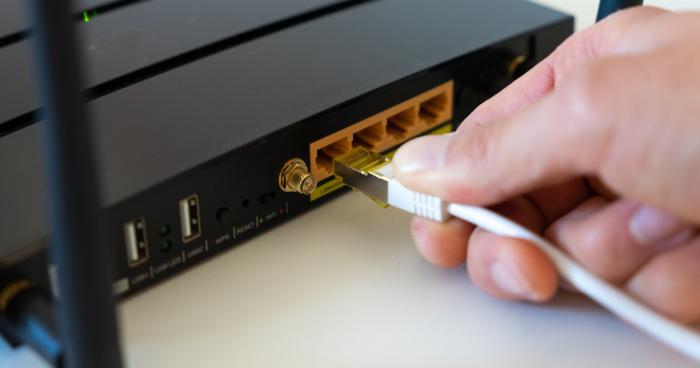
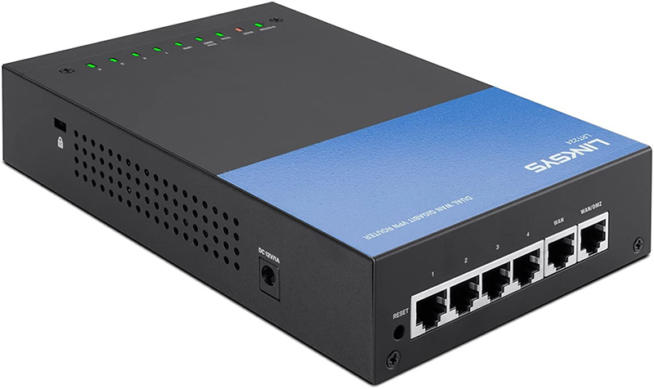
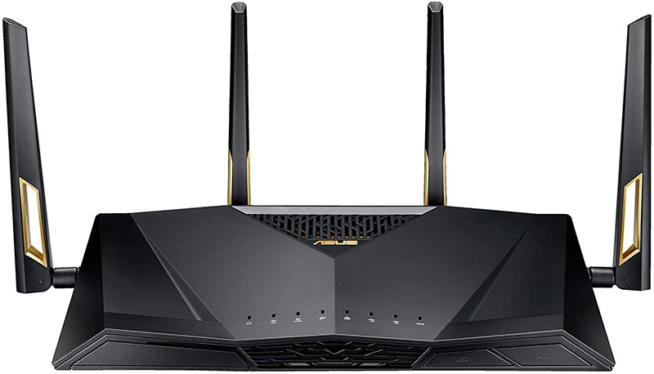
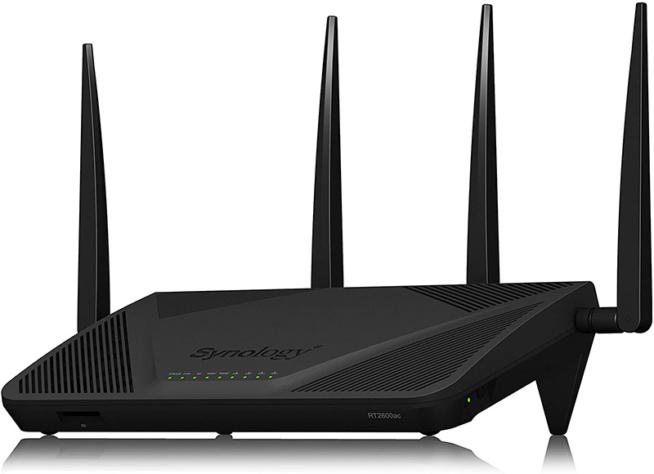
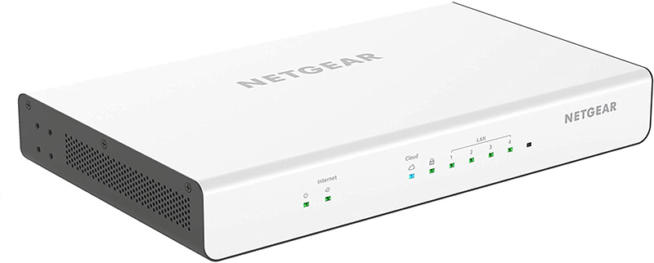
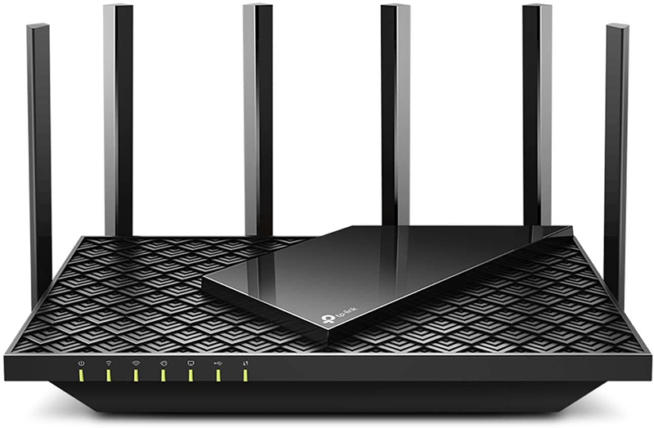
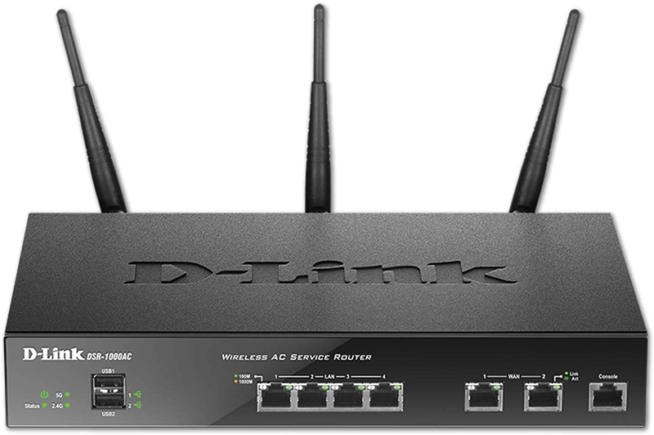
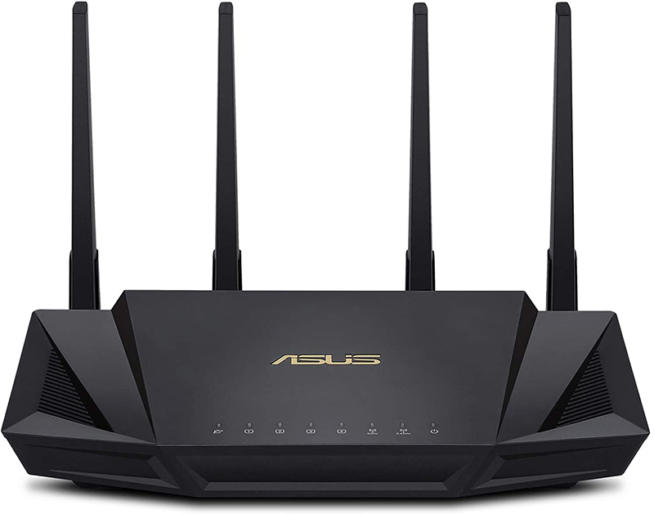

![Best NAS Devices for Small Businesses in [year] Best NAS Devices for Small Businesses](https://www.privateproxyguide.com/wp-content/uploads/2022/07/Best-NAS-Devices-for-Small-Businesses-150x150.jpg)

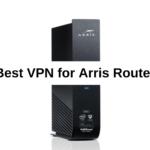

![7 Best VPN for Asus Routers in ([year]) & Setup Instructions Best VPN for Asus Routers](https://www.privateproxyguide.com/wp-content/uploads/2022/08/Best-VPN-for-Asus-Routers-150x150.jpg)
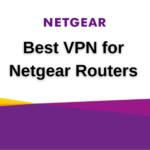
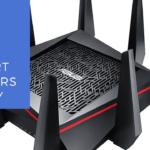

![Best Web Hosting for Small Business in [month] [year] Best web hosting for small business](https://www.privateproxyguide.com/wp-content/uploads/2022/03/Best-web-hosting-for-small-business-150x150.jpg)
![Best Hardware Firewalls for Home & Small Business [year] Best Hardware Firewall](https://www.privateproxyguide.com/wp-content/uploads/2022/07/Best-Hardware-Firewall-150x150.jpg)

![5 Best VPN Providers ([year]) [PC, iOS, Android] VPN](https://www.privateproxyguide.com/wp-content/uploads/2021/03/vpn-150x150.jpg)
![Best VPN for Kodi in [month] [year] Best VPNs for Kodi 2021 - To Avoid Buffering & Other Issues](https://www.privateproxyguide.com/wp-content/uploads/2018/05/kodi-launch-logo-150x150.jpg)

![Best VPN for DraftKings in [month] [year] Best VPN for DraftKings](https://www.privateproxyguide.com/wp-content/uploads/2018/07/Best-VPN-for-DraftKings-150x150.jpg)